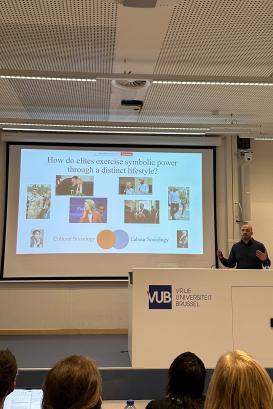
On 23 October 2025, Bryan Boyle successfully defended his doctoral dissertation entitled "Labour of Distinction: Notebooks of an Apprentice Butler".
His research was conducted under the supervision of Prof. Dieter Vandebroeck.
Congratulations to Dr. Boyle!
Below you can find the abstract of the dissertation, as well as a link to a related publication.
The question of how elites exercise symbolic power through a “distinct lifestyle” has long animated sociologists of class and status. While most prior explanations for cultural stratification have focused on how elites are socialised and educated, as well as the institutions that legitimise their lifestyle, this thesis turns its gaze to a relatively unstudied factor in status production: the labour that is geared toward the production and reproduction of an employer’s distinct lifestyle — what I call the “labour of distinction.”
I explore this process by studying the craft of the butler, a profession that was once considered obsolete but has witnessed a surprising revival over the last forty years, as inequalities have risen and the super-rich have grown. Drawing from an ethnography that involved training and working as a butler myself, I illustrate how butlers produce distinction for the elites they serve through four core dimensions of their labour practice. These are: (1) curatorship, in the management of their employers’ class symbols (such as how butlers orchestrate private dining and possess expertise in multiple areas of elite consumption); (2) menialism, in freeing employers from “vulgar” practices (such as how butlers undertake physical and cognitive “dirty work”, allowing employers to embody a distinct sense of ease; (3) Veblenian embodiment, in signalling employers’ status through bodily display (such as how butlers dress conspicuously as servants and exaggerate their service skills); and (4) non-personship, in procuring social distance between labourer and employer (such as how butlers deliver service discretely, removing themselves as participants in the elite lifestyle they help produce).
The theory that this dissertation builds conceives of this type of labour as operating far beyond the niche craft of the butler. It outlines how multifarious roles across the labour force – from housekeepers to security guards, chefs, personal assistants, stylists, art consultants, VIP girls, and hired celebrities – are also involved in producing elite lifestyles and elite formation in general. Crucially, as a concept and field of study, “the labour of distinction” offers a critique of elite symbolic power, deconstructing elite distinction by revealing how its very operation depends upon the efforts of others (those without distinction) to uphold it.
